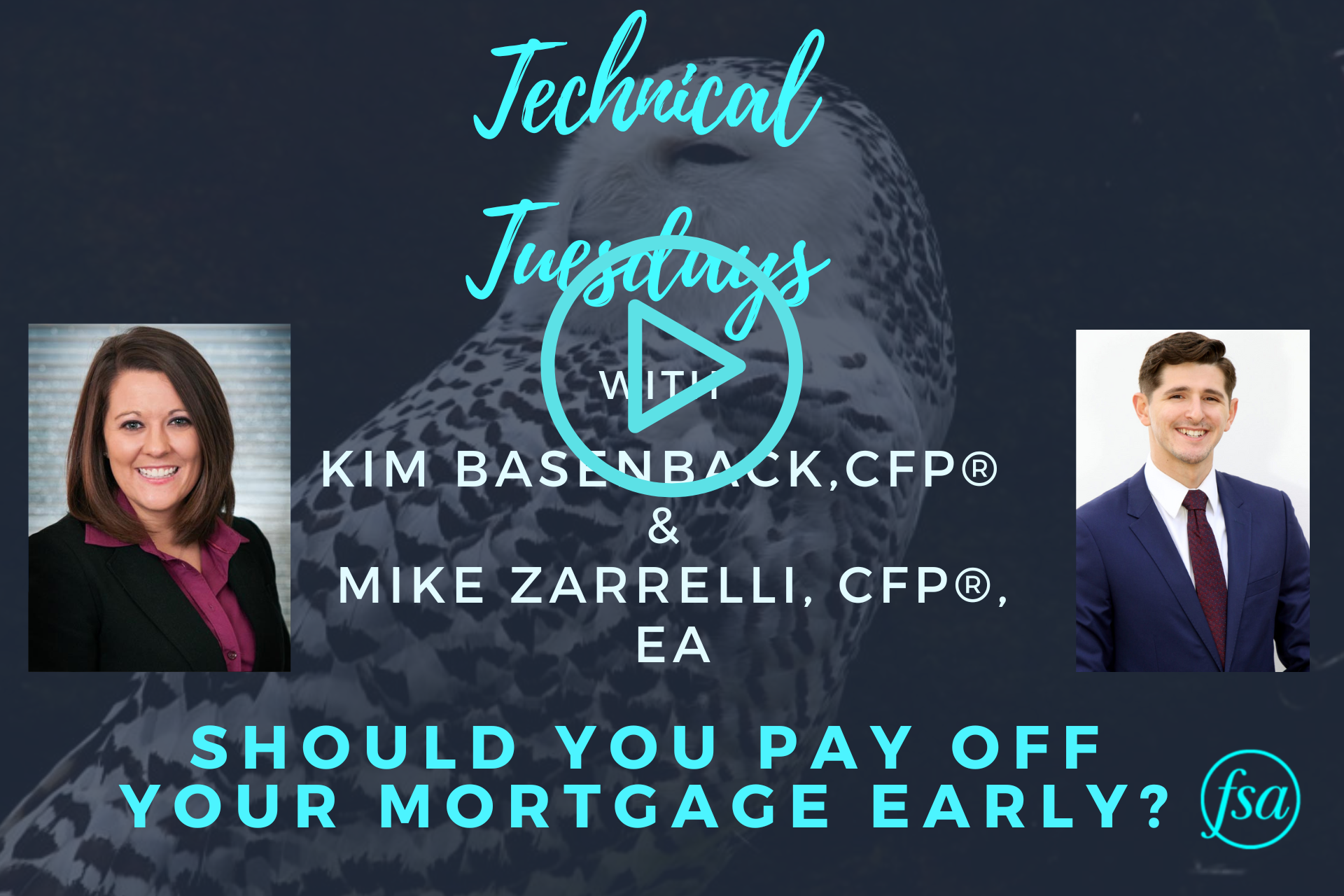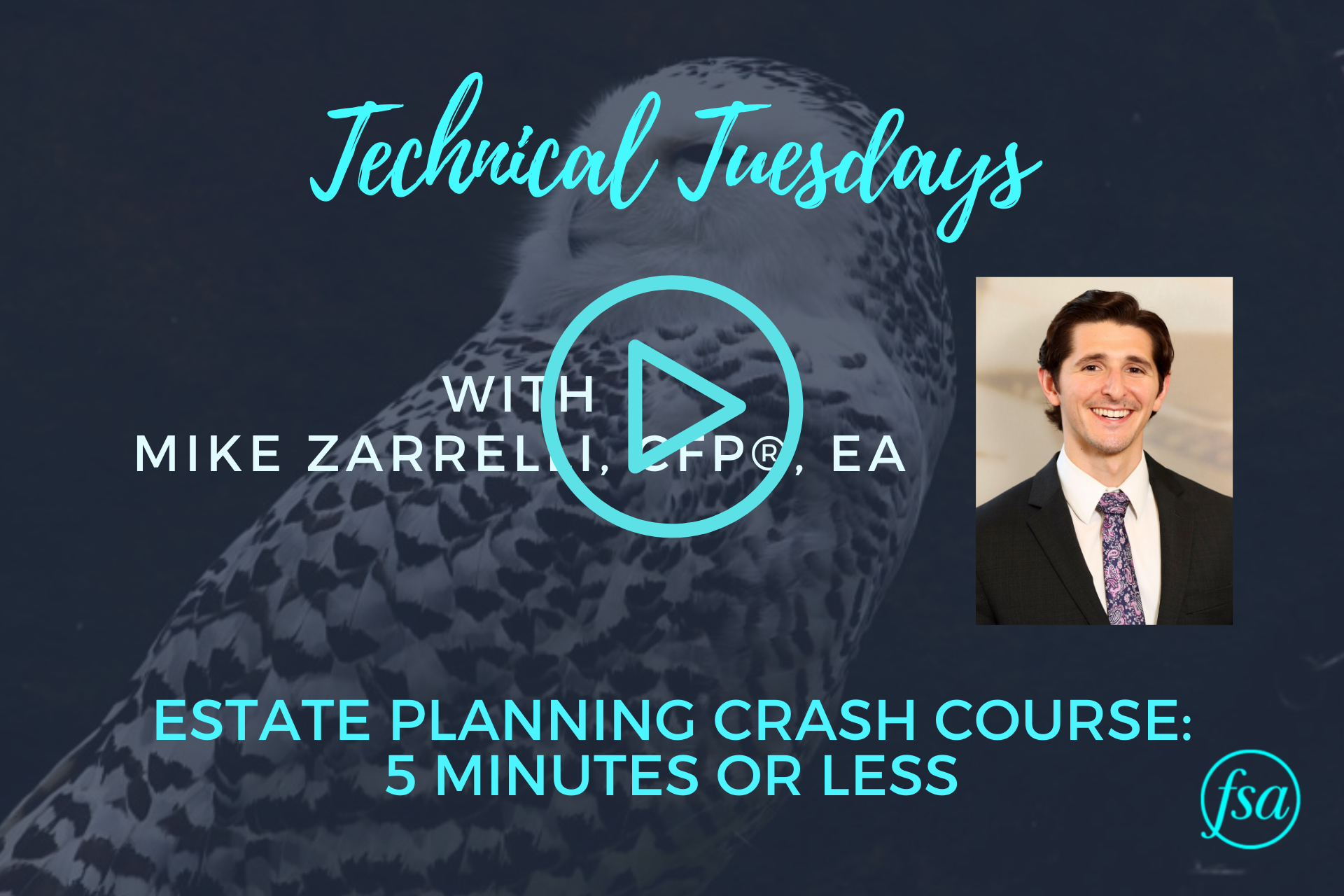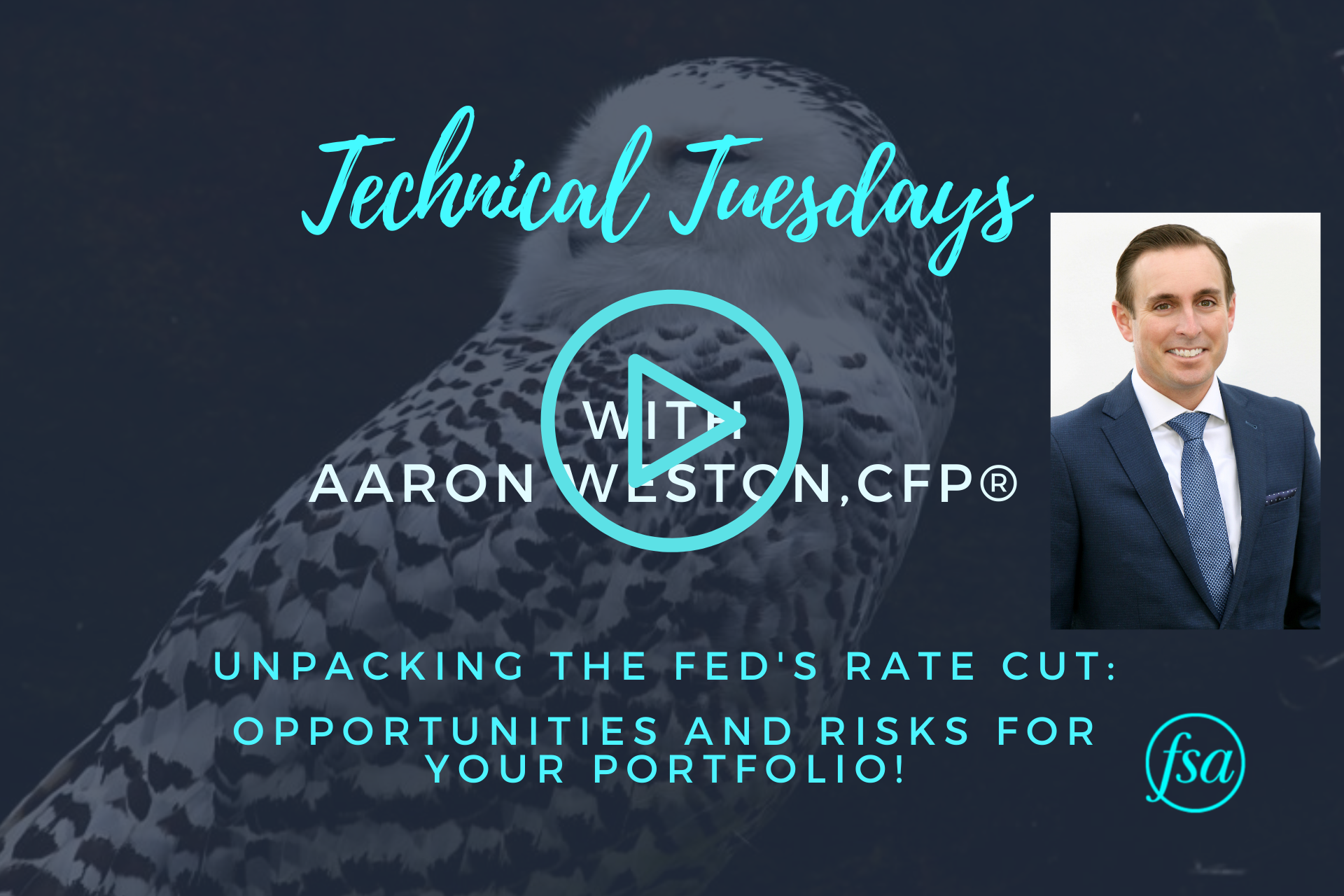Kim Basenback, CFP®, and Mike Zarrelli, CFP®, EA, discuss the financial and emotional reasons to consider when deciding whether to pay off your mortgage early.
Should You Pay off Your Mortgage Early Transcript
Mike Zarrelli:
Hey, everyone. Thanks for joining us for this month’s Technical Tuesdays. I’m Mike Zarrelli, and with me I have Kim Basenback. Hey, Kim. How’s it going? What’s going on new in your world?
Kim Basenback:
Hey, Mike. I am great. Actually, probably the most noteworthy thing is my husband and I recently closed on and moved into our first home together, so we are so excited to be in a new space and for it to be ours. So, how about you?
Mike Zarrelli:
Yeah, first off, congratulations. I’ll actually be joining you in the home ownership journey in the not-too-distant future, which is why we wanted to bring up this conversation topic. When should I or when shouldn’t I pay off my mortgage early since we’ll be heading down that journey together? So, before we give any answers and talk about all the factors, let’s zoom out, and Kim, what’s the context that we need from clients to help make an informed decision?
Kim Basenback:
Yeah, great point. So, there are a few kind of data points that help us from a financial side determine whether it makes sense for you to pay down your mortgage. So, you’ll hear us reference these. This would include your age; your financial situation which would be assets, liabilities, how much liquidity or cash do you have on hand. Third would be what goals do you have, what are you wanting to achieve, what money outlay is going to be in the near or mid term. And then lastly, but very important, is the interest rate on your mortgage. All of these help us kind of determine from a financial standpoint does it make sense for you to pay it off.
And speaking of, there’s generally kind of two areas that we look at: the financial component, which is really important, but also, sometimes just as important, is the emotional side of things. So Mike, why don’t you talk about the financial, and then I can touch on the emotional side?
Mike Zarrelli:
Yeah, great. So, on the financial side, debt gets a really bad rap. But when you’re looking at the numbers, not all debt is bad debt, especially low interest debt. And when you look at the numbers, as long as your interest rate is lower than what you could confidently make investing the money instead, then it doesn’t make sense to pay off your mortgage. Now, as we all know there’s no guarantee in investing, so there is a gray area in terms of your interest rate. If your interest rate is in that 4-6% area, then it’s a much, much more difficult decision. Because in a year like this year where the market’s doing poorly, you probably wish that you did make that extra payment to your mortgage instead of investing it.
Now, there’s a couple of important things you want to keep in mind when you’re going through this thought process. First is, if you have extra cash flow and you were thinking about making an extra payment but decide not to, you have to actually invest that extra cash flow. So, if your mortgage rate is here and you don’t invest it, let’s say you spend it or just keep it in the checking account, well then, you’re still at a deficit and you’re not getting that benefit. The same thing goes for when you’re investing a lump sum. If you don’t take the lump sum and invest it, and instead you buy a boat or keep it in your savings, well then, you’re not getting the benefit that you would compared to just putting it towards the mortgage.
The last thing to keep in mind is the liquidity aspect that Kim mentioned. We don’t want you to take your liquidity, your cash on hand, and put it into an illiquid asset, which could make you house rich but cash poor. And then the worst case scenario happens where you need your water heater to be replaced and you’ve already used up all your liquidity, and now you’re pulling from a retirement account to pay for that. That’s the situations that we really want to avoid, at least on the financial side. How about on the emotional side?
Kim Basenback:
Yeah, great points, Mike. So, from an emotional standpoint, there are a lot of clients that see debt as a burden, and that can have a real impact on them, whether it’s just a high level of stress or not being able to sleep at night. And for those individuals, especially with those big impacts, that would be something we’d want to weigh. And especially if they were someone that was in that gray area of, from an interest-rate perspective, that maybe it might make sense either way, then that emotional side could kind of sway the decision of, hey, maybe it does make sense for you to chunk a lot more towards your mortgage and pay that down sooner.
We’ve also had situations where, I mentioned age being a factor early on, but let’s say you’re approaching retirement. We’ve had a number of clients in this situation, and you want to have that kind of freedom when you retire of not having that monthly payment to your mortgage. You want to free up your cash flow, and that can make a big impact as to whether it might make sense, and then especially if you’re living on a very finite stream of income, having that out of the way could really help. So yeah, there are a number of ways and areas that we just want to make sure from an emotional standpoint and look into how that debt impacts you.
Mike Zarrelli:
Yeah, great points. I mean, we’ve had this discussion many times with clients, and we’ve seen people on the one side of the spectrum with being really focused on the financials and then others on the emotional side and everything in between, of course. Kim, what are some solutions that people in between can use to kind of get the best of both worlds?
Kim Basenback:
Sure. Yeah, so, if you’re looking for something where you can pay a little bit more towards your mortgage but still be able to invest and kind of save for other goals that you have, one option could be just to round up what your monthly payment is. So you could round your mortgage payment up to the nearest ten or even hundred dollars, depending on what your payment is, but so it would from a monthly perspective probably feel like not a big impact, but over the life of the loan that would have an impact on the timing of how long it takes to pay down your mortgage. So, small change but could have an impact or would have an impact down the road.
Another thing I would mention would be, this one’s a little bit more unique, but you could make your mortgage payment but pay half twice a month. So you’d have to do it the month before because you don’t want to be late on your mortgage, but if you paid half on say the 15th and half on the 30th, your first payment is only 15 days of interest rather than the normal 30 days of interest that would accrue before your payment is due. So theoretically, you’d be paying a little bit more towards principal since you’re paying the normal amount. So again, very small change, and in fact that doesn’t even change the amount of what you pay but would have an impact over the long term. And as Mike mentioned, it would be important to also be saving outside of that so that way you’re doing both, putting money away while also paying towards your mortgage.
Mike Zarrelli:
Great point. Those are some awesome solutions to kind of meet somewhere in the middle. One thing I would want to mention to keep in mind is that if you do decide to go with one of these strategies, you definitely want to talk to your mortgage broker and see if there’s a prepayment penalty that you could be dealing with because the last thing we want to see is to have this monumental moment where you paid off your mortgage and then get slammed with a payment right after. Just something we totally would want to avoid, and in fact, as advisors we say we’d want to plan for.
Kim Basenback:
Great, yeah. And I would add that this would be a great time for you to talk to, shamelessly, a financial advisor like me and Mike, and we could help talk through your specific situation and both the financial and the emotional components to see if it makes sense for you to pay down your mortgage. If you have any questions about your specific situation, we’re happy to chat with you. Feel free to email us at questions@FSAinvest.com, or you can call us at 301-949-7300.
This has been Kim and Mike with Technical Tuesdays. Thanks.
Mike Zarrelli:
Thanks.
FSA’s current written Disclosure Brochure and Privacy Notice discussing our current advisory services and fees is available at www.FSAinvest.com/disclosures or by calling 301-949-7300.




